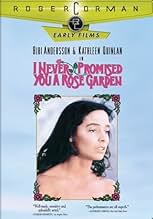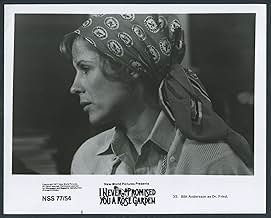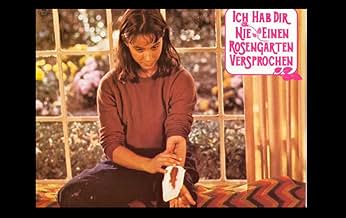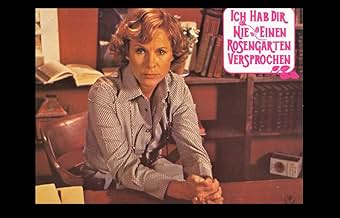Ich hab' dir nie einen Rosengarten versprochen
Originaltitel: I Never Promised You a Rose Garden
IMDb-BEWERTUNG
6,4/10
1666
IHRE BEWERTUNG
Füge eine Handlung in deiner Sprache hinzuA disturbed, institutionalized 16-year-old girl struggles between fantasy and reality.A disturbed, institutionalized 16-year-old girl struggles between fantasy and reality.A disturbed, institutionalized 16-year-old girl struggles between fantasy and reality.
- Regie
- Drehbuch
- Hauptbesetzung
- Für 1 Oscar nominiert
- 4 Nominierungen insgesamt
Karin Collison
- Nurse
- (as Elizabeth Dartmoor)
Barbara Steele
- Idat
- (Gelöschte Szenen)
Empfohlene Bewertungen
This is a film which came too late.Anybody who sees it is going to compare it to Anatole Litvak's "the snake pit" (1948).But that was then and this is now and the evolution is barely discernible.If "snake pit" was (unfairly) dismissed as obsolete,what can we say of a movie which was produced thirty years later and (roughly) depicts the same milieu? The most interesting thing in that average-to-good foray into psychiatry is its cast.Bergmanian Bibi Anderson is ideally cast as the shrink who tells the disappointed heroine "I've never promised you a rose garden".But there are also former glories such as Signe Hasso and Sylvia Sydney and future stars (Dennis Quaid).
10Dara-3
Kathleen Quinlan plays Deborah, a very bright girl, who is institutionalized for three years in a psychiatric hospital. Though different from the book in some ways, this keeps the spirit of it quite well and with a much more satisfying ending than the book. Quinlan is a wonderful actress. Deborah, who is diagnosed as a schizophrenic (though she probably wouldn't be today), has a long, torturous journey through her illness. Quinlan makes us believe that she will succeed. In addition, there is a strong cast of mostly women of many ages. I saw this film first when I was a teenager and the problems Deborah faced also resonated with me (despite not being in a hospital). I have never forgotten this film, though it has been out of print on video for many years and can only view it when it occasionally makes it on television. Catch it if you can -- especially if you are a teenage girl or ever were.
Not a movie to catch if you're feeling down. Those scenes in the dayroom where the afflicted patients mingle are almost scary. Each woman acts out her own version of mental derangement, from hollering, to yelling in-your-face, to grabbing and shoving. Looks to me like the Pittsburgh Steelers are needed to keep order. In fact, I can't understand why therapeutic science would allow such intermingling among the psychologically afflicted. Just what the therapeutic effects might be is beyond me. Actually the tormented images brought back similar ones from the 1948 flick, The Snake Pit, that scared the heck out of me as a kid, except this 1977 epic should maybe be called The Demon Pit. I guess this movie's ironic title was so as not to scare off prospective viewers.
Actually what holds the movie together are outstanding performances by the two leading actresses, Quinlan and Andersson. I don't think I've seen a more emotionally affecting turn than Quinlan's, as her teenage Deborah poignantly struggles with inner demons she imagines as some kind of tyrannical barbarians. Aside from that inner struggle, we unfortunately know little about her or why she has lost her grip. Or for that matter do we know much about any of the many characters roaming the halls. Coming to Debbie's aid is psychiatrist Dr. Fried portrayed winningly by Swedish actress Andersson. She's low-key in her methods and between the two there's a growing magnetism that brings us back from the scenes of torment. To me, Quinlan at least deserved an Oscar nomination as I don't think I've been so moved in 70 years of movie watching as by her huggable presence. Also, it's good to see vintage actress Sylvia Sydney picking up a payday. Forty years earlier and that fine soulful actress could have succeeded as the poignant young Deborah.
(In Passing: Though it passes by quickly, note Deborah's unconventionally hairy armpit, showing her rejection of a significant gender norm. It also shows production's careful attention to minor detail.)
All in all, the movie's too exotic for me to rate on the usual scale. But, despite the histrionics and foggy chairacter backgrounds, you may want to catch its engagingly sensitive core.
Actually what holds the movie together are outstanding performances by the two leading actresses, Quinlan and Andersson. I don't think I've seen a more emotionally affecting turn than Quinlan's, as her teenage Deborah poignantly struggles with inner demons she imagines as some kind of tyrannical barbarians. Aside from that inner struggle, we unfortunately know little about her or why she has lost her grip. Or for that matter do we know much about any of the many characters roaming the halls. Coming to Debbie's aid is psychiatrist Dr. Fried portrayed winningly by Swedish actress Andersson. She's low-key in her methods and between the two there's a growing magnetism that brings us back from the scenes of torment. To me, Quinlan at least deserved an Oscar nomination as I don't think I've been so moved in 70 years of movie watching as by her huggable presence. Also, it's good to see vintage actress Sylvia Sydney picking up a payday. Forty years earlier and that fine soulful actress could have succeeded as the poignant young Deborah.
(In Passing: Though it passes by quickly, note Deborah's unconventionally hairy armpit, showing her rejection of a significant gender norm. It also shows production's careful attention to minor detail.)
All in all, the movie's too exotic for me to rate on the usual scale. But, despite the histrionics and foggy chairacter backgrounds, you may want to catch its engagingly sensitive core.
But there is still a very interesting movie in here with a number of memorable sequences.
The movie is about our protagonist, who to our understanding, is a teenaged girl, who apparently either hallucinates about some bizarre fantasy world (and not in a fun Terry Gilliam way but a seriously bizarre "why would she even consider this superior way?") or merely is in fantasy about it in escaping from reality, it's not explained. It begins as she goes to a mental hospital in the countryside it looks and almost immediately our main character inexplicably stabs herself and gets thrown in a disturbed section as opposed to the initial summer camp section. It is here, where our story follows the rest of the film, a series of up and down spirals and looks at her interactions with the other patients.
The thing about all of this is we never actually get to understand the characters at all. We are never told what they're about, why they feel this way, what their backgrounds are, and why they do what they what they do. They just are, and throughout the whole piece the audience feels like with any of the characters, it never surpasses the point of acquaintment because even, if the characters be developed, they were never characterized in the first place, so it's irrelevant. At the same time, though the movie certainly to its benefit explores the setting and situation in a very visceral way, by the movie's end, everything feels oversaturated, because it feels as though we have spent such time in this setting watching similar things with people that don't really mean much for so long that it just starts to wear thin. When the film end, we aren't really sure why the events have turned out as they did, because we aren't really sure why they were the other way in the first place. It just feels like a breath of fresh air to get a new sense of scenery.
The thing is, though, despite that, the movie is still successful probably because the happenings themselves are rather interesting, the unflinching portrayal has the power to captivate, and there is claustrophobic intensity to the asylum as well as a general heterosexual male (being the viewer) to recessive female women appeal, which really adds a type of close-knit feel with the characters.
So, it's not the most satisfying nor the most well-devised film of its genre out there, but if you be a fan of asylum films, this is definitely worth checking out. I also must note that out of all the mental hospital films out there, this is probably the most intense. This movie is 100% serious and very frightening and unsettling. There's no comedy nor light-heart in this movie. The tone is closer to a horror film (despite that it is a pure dramatic realism) than it is to One Flew Over the Cuckoo's Nest. From that perspective this film is actually very unique.
The movie is about our protagonist, who to our understanding, is a teenaged girl, who apparently either hallucinates about some bizarre fantasy world (and not in a fun Terry Gilliam way but a seriously bizarre "why would she even consider this superior way?") or merely is in fantasy about it in escaping from reality, it's not explained. It begins as she goes to a mental hospital in the countryside it looks and almost immediately our main character inexplicably stabs herself and gets thrown in a disturbed section as opposed to the initial summer camp section. It is here, where our story follows the rest of the film, a series of up and down spirals and looks at her interactions with the other patients.
The thing about all of this is we never actually get to understand the characters at all. We are never told what they're about, why they feel this way, what their backgrounds are, and why they do what they what they do. They just are, and throughout the whole piece the audience feels like with any of the characters, it never surpasses the point of acquaintment because even, if the characters be developed, they were never characterized in the first place, so it's irrelevant. At the same time, though the movie certainly to its benefit explores the setting and situation in a very visceral way, by the movie's end, everything feels oversaturated, because it feels as though we have spent such time in this setting watching similar things with people that don't really mean much for so long that it just starts to wear thin. When the film end, we aren't really sure why the events have turned out as they did, because we aren't really sure why they were the other way in the first place. It just feels like a breath of fresh air to get a new sense of scenery.
The thing is, though, despite that, the movie is still successful probably because the happenings themselves are rather interesting, the unflinching portrayal has the power to captivate, and there is claustrophobic intensity to the asylum as well as a general heterosexual male (being the viewer) to recessive female women appeal, which really adds a type of close-knit feel with the characters.
So, it's not the most satisfying nor the most well-devised film of its genre out there, but if you be a fan of asylum films, this is definitely worth checking out. I also must note that out of all the mental hospital films out there, this is probably the most intense. This movie is 100% serious and very frightening and unsettling. There's no comedy nor light-heart in this movie. The tone is closer to a horror film (despite that it is a pure dramatic realism) than it is to One Flew Over the Cuckoo's Nest. From that perspective this film is actually very unique.
Deborah Blake (Kathleen Quinlan) is admitted to a country institution by her high street parents, unable to cope with the ignominy brought upon them, by her erratic, anti-social behaviour.
Taunted by her inner-demons (to which we're treated inventively from the mind's eye perspective), she's gradually cajoled from her psychosis by the unassuming, yet fiercely determined treating doctor - Bibi Andersson delivering a warm, sympathetic performance and headlining an impressive female cast that includes Signe Hasso, Susan Tyrrell, Diane Varsi, Silvia Sidney, screenwriter /actress Darlene Craviotto and taking a short break from her maternal duties on Martha's Vineyard, Lorraine Gary.
Along the journey, there's a couple of plot diversions, some poignant, others hackneyed and exploitative, but then would New World Pictures ever have distributed this movie without a stereotypical bully nurse scenario? Unlikely.
The Roger Corman production combines cinematic liberties with an at-times reverent translation of the Hannah Green novel, creating a compelling B-movie possessing an unusual dramatic-fantasy film tone. A cynical viewer might postulate that Corman saw a payday following the success of "One Flew Over the Cukoo's Nest", and to a large extent, this remains exploitative cinema. That said, Quinlan's performance clearly defies that brand, her characterisation personifies trauma and whilst often intense, isn't overcooked.
You have to commend New World Pictures for taking the plunge with this release against type, especially when you consider the other titles in their production line and catalogue at the time; 'Rose Garden' is a very different breed to your typical locally made New World Picture. Not perfect by any means and does have a tendency to stigmatise the subject matter, nevertheless an enjoyable film in spite of its flaws.
Taunted by her inner-demons (to which we're treated inventively from the mind's eye perspective), she's gradually cajoled from her psychosis by the unassuming, yet fiercely determined treating doctor - Bibi Andersson delivering a warm, sympathetic performance and headlining an impressive female cast that includes Signe Hasso, Susan Tyrrell, Diane Varsi, Silvia Sidney, screenwriter /actress Darlene Craviotto and taking a short break from her maternal duties on Martha's Vineyard, Lorraine Gary.
Along the journey, there's a couple of plot diversions, some poignant, others hackneyed and exploitative, but then would New World Pictures ever have distributed this movie without a stereotypical bully nurse scenario? Unlikely.
The Roger Corman production combines cinematic liberties with an at-times reverent translation of the Hannah Green novel, creating a compelling B-movie possessing an unusual dramatic-fantasy film tone. A cynical viewer might postulate that Corman saw a payday following the success of "One Flew Over the Cukoo's Nest", and to a large extent, this remains exploitative cinema. That said, Quinlan's performance clearly defies that brand, her characterisation personifies trauma and whilst often intense, isn't overcooked.
You have to commend New World Pictures for taking the plunge with this release against type, especially when you consider the other titles in their production line and catalogue at the time; 'Rose Garden' is a very different breed to your typical locally made New World Picture. Not perfect by any means and does have a tendency to stigmatise the subject matter, nevertheless an enjoyable film in spite of its flaws.
Wusstest du schon
- WissenswertesThe lead female role of of Deborah Blake in this picture was previously intended for Natalie Wood who had unrealized plans to both produce and star in the movie. Wood once had planned to produce the picture as well as star in it in the role of Deborah Blake but those plans never materialized. The part in the end was played in the film by Kathleen Quinlan.
- PatzerIn the New Year's Eve party scene, Deborah is seen with loose hair talking to Dr. Fried and then there is a close-up of Deborah with her hair pulled back from her forehead.
- Zitate
Deborah Blake: You can turn me off, you know. You can go off with your friends and write another paper on schizophrenia and get an award for it. But I can't turn me off. So I'm calling off the fight.
Dr. Fried: So you quit. Stay in the nuthouse for the rest of your life.
Top-Auswahl
Melde dich zum Bewerten an und greife auf die Watchlist für personalisierte Empfehlungen zu.
- How long is I Never Promised You a Rose Garden?Powered by Alexa
Details
- Erscheinungsdatum
- Herkunftsland
- Offizieller Standort
- Sprache
- Auch bekannt als
- I Never Promised You a Rose Garden
- Produktionsfirmen
- Weitere beteiligte Unternehmen bei IMDbPro anzeigen
Zu dieser Seite beitragen
Bearbeitung vorschlagen oder fehlenden Inhalt hinzufügen

Oberste Lücke
By what name was Ich hab' dir nie einen Rosengarten versprochen (1977) officially released in India in English?
Antwort

































